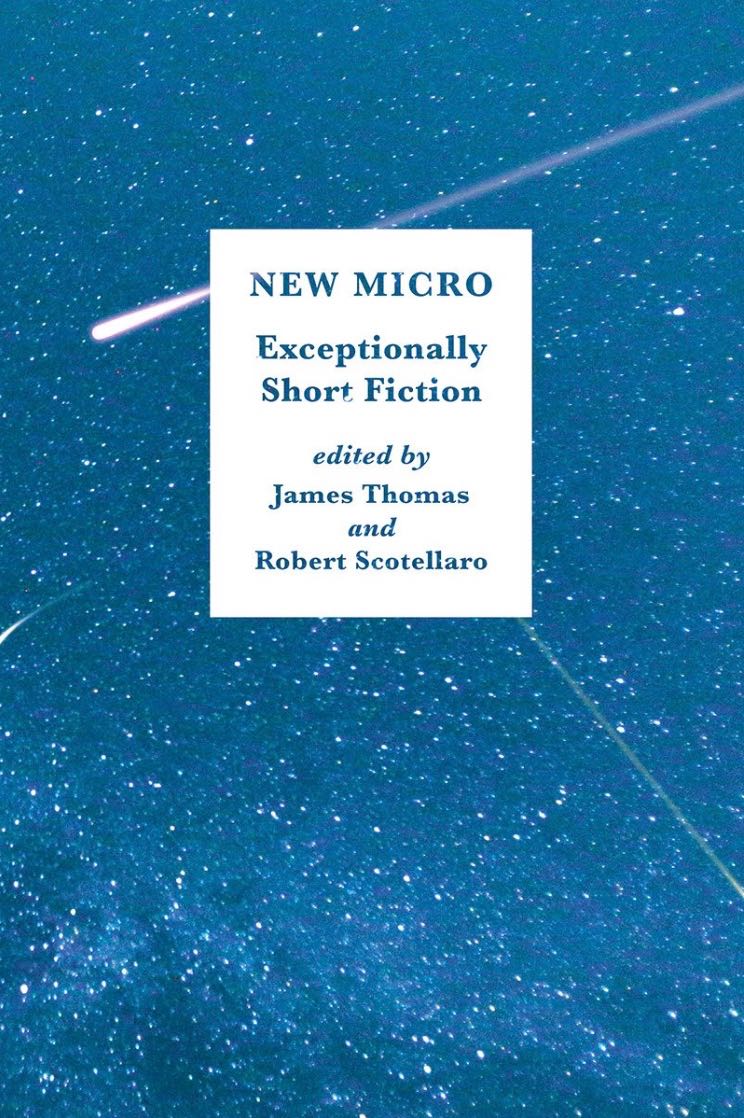James Thomas and Robert Scotellaro, editors
New Micro: Exceptionally Short Fiction
reviewed by Alison McBain

New Micro: Exceptionally Short Fiction Publisher: WW Norton & Company Date: August 7, 2018 Length: 192 pages ISBN: 0393354709; 9780393354706 |
Flash fiction is one of my favorite forms, both to read and to write. So I was very excited that New Micro: Exceptionally Short Fiction crossed my review desk. It contains a powerhouse collection of 135 stories by 90 authors. A number of the highly-lauded writers have multiple stories in the collection, and all of the stories are 300 words or less.
I know some readers wonder how a great story can be told in 300 words. It takes a certain kind of vision by the author, and each word therefore becomes important: there can be no wasted space. And what is said is as important as what’s not said.
Flash fiction is like Zen art. Simplicity is the key, and an entire story can be suggested with just an image, just a scene, just a capturing of an emotion. As mentioned in the foreword by Robert Shapard, “It’s been said that micros can do in a page what a novel does in two hundred.”
Most of the stories in the collection are told in first or third person, with a few forays into second person. They are divided equally between vignettes and stories with a complete arc. Many focus on literary styles and ethos, such as stream-of-consciousness narratives, slow-paced capturing of a single, life-like image, and the darker, more serious themes such as love and loss, death and grief, addiction and adultery. But there’s an equally important smattering of humor pieces throughout the anthology, including dark humor and literary escapades into the absurd.
Some of the writers experiment with form, such as Gay Degani’s “Abbreviated Glossary.” Her piece has a truly clever format that sets up a list of definitions like a dictionary, but tells a complete story about a woman who persuades her reluctant lover that a pregnancy will be good for them. Their relationship goes well until there’s a problem with the baby in utero.
Then there’s Damian Dressick’s “Four Hard Facts About Water,” which has events in a numbered list. The list is somewhat backwards in terms of chronological order, but the reader learns by number four why the first fact about the price of whiskey is so important. It has a powerful and truly sad twist ending.
Although all the stories have something to offer the reader, the ones that often captured and held my interest had me thinking about them long after I finished reading them. These were the ones that put preconceived notions on their head. For example, Kathy Fish’s “The Possibility of Bears,” which has you booing one character all the way until the end, when you realize that the author has cleverly shown why your knee-jerk reaction was wrong. Or Sarah Freligh’s “Another Thing,” which talks about the end of the world as a joke, but in a way, the joke turns out to be true.
Then there are the stories that do a great job of painting a stylistic picture, such as Tania Hershman’s “My Mother Was an Upright Piano.” The conceit is held throughout the story, and the imagery is captivating. Or Ron Koertge’s “War,” which talks about a soldier’s post-traumatic stress disorder as “the poetry of war.”
I’m also a sucker for humor, so the stories that made me laugh (often in surprise) were among my favorites. There was Amelia Gray’s “AM:103” that shows how sometimes a person can negotiate her way through a breakup. Or David Shumate’s “The Polka-Dot Shirt,” which explores the idea of a person’s identity and how much it’s related to image. I also enjoyed Paul Beckman’s “Brother Speak,” which shows how brothers sometimes have their own language. And the final story of the collection, Ron Carlson’s “Grief,” where reported facts aren’t always what they seem.
Last but not least, a few more of the truly stand-out stories of the collections crossed boundaries in new and unexpected ways. There was Bernard Cooper’s “The Hurricane Ride,” which examines how reality can be altered with the notion of speed. Also Lynn Mundell’s “The Old Days,” which tackles a man’s choices in life that have become a slippery slope down the wrong path.
I enjoyed Tiff Holland’s “Hot Work,” which explores the secrets some men keep. And I particularly felt the resonance of Melissa McCracken’s “Implosion,” which is both funny and sad, one of the hardest combinations to pull off effectively (and amazing to do in under 300 words). There’s also a great, but unexpected, perspective in Richard Brautigan’s “Women When They Put Their Clothes On in the Morning,” with a killer last line that lingers.
I’d like to quote from the afterword written by Christopher Merrill, which I think does a great job of summing up why writers and readers alike are making flash fiction so popular.
“Less is more: this is the currency of prose poetry and micro fiction alike. ... It [the story] will not last long, but it will haunt you forever.”
I agree with Mr. Merrill. This is a wonderful collection of micro fiction and a great way to discover — or continue with — your love of the form. I hope you enjoy reading it as much as I did.
Copyright © 2018 by Alison McBain

